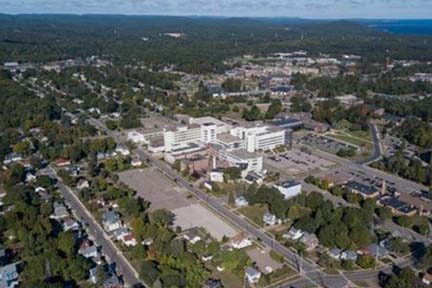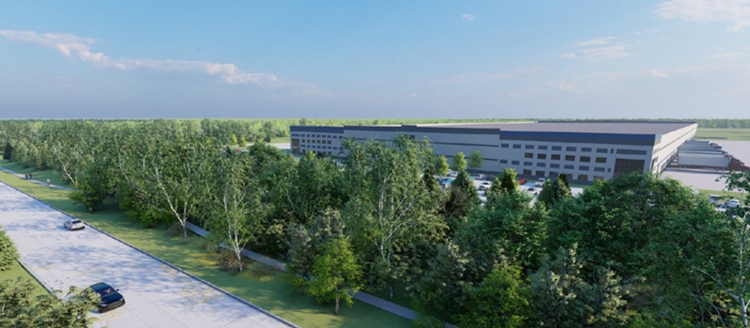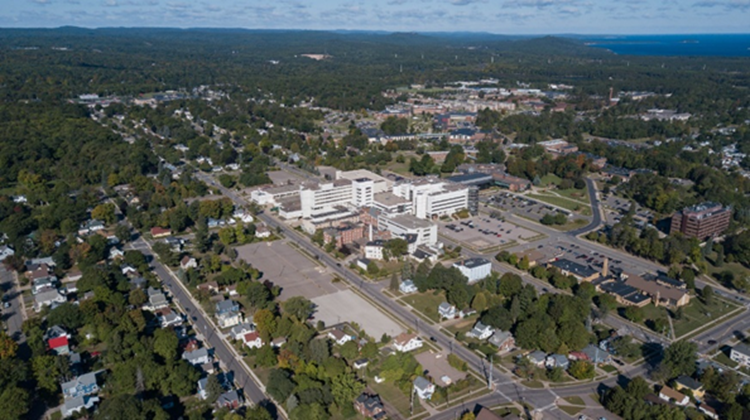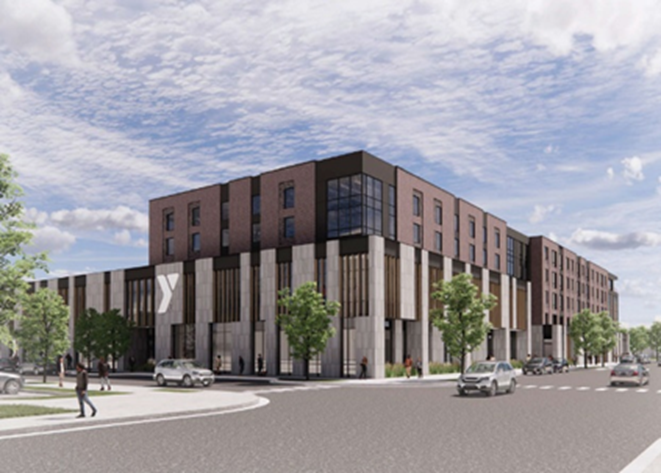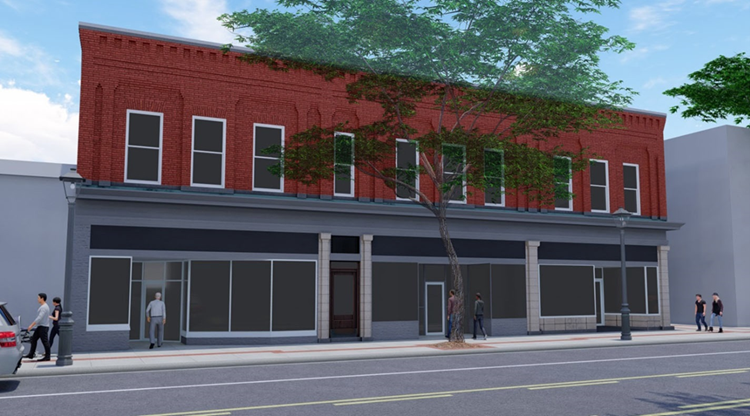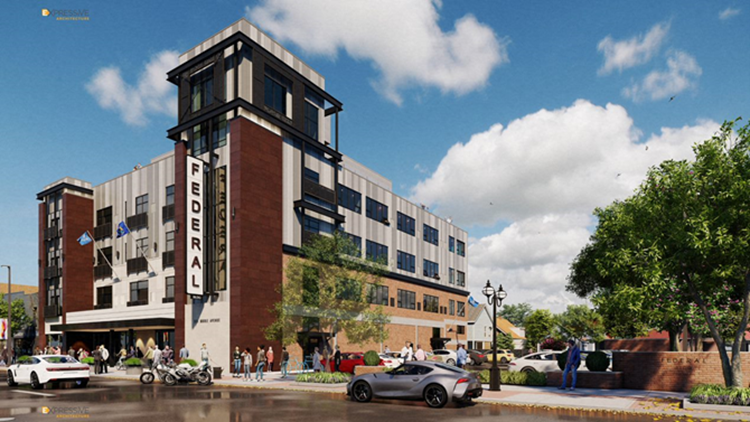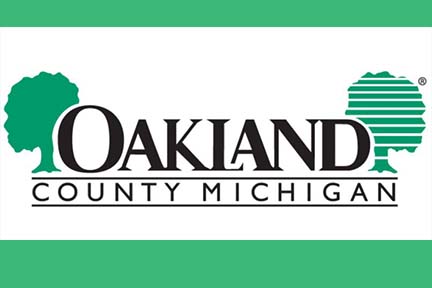
Gov. Whitmer Announces Community Revitalization Projects Across Michigan, Supporting Hundreds of Jobs, Driving $200 Million in Investment
Projects will build affordable housing, remove blight, create commercial space
LANSING, Mich. – Today, Governor Gretchen Whitmer joined the Michigan Economic Development Corporation to announce Michigan Strategic Fund approval of a wide range of projects that could lead to the creation or retention of 421 jobs and generate nearly $203 million in investment in Michigan. These projects include redevelopment or renovation of underutilized properties to build affordable housing, create commercial space, and remove blight in Taylor, Marquette, Hancock, Flint, Muskegon, Alma, Petoskey, and Wyandotte.
“Today’s projects will create and retain over 400 jobs and drive more than $200 million of investment into communities across Michigan,” said Governor Whitmer. “From redeveloping a manufacturing building in Taylor, bringing a grocery store to downtown Hanock, and building a mixed-use YMCA in Flint, these projects will continue growing our economy. Together, we are putting Michiganders first by fostering strong, long-term economic opportunity in every region of our state.”
“The projects approved today will bring good jobs to Michigan residents, support vibrant communities, help increase growth opportunities for small businesses, and boost our talent pipeline in strategic industries,” said Michigan Economic Development Corporation CEO and Michigan Strategic Fund President and Chair Quentin Messer Jr. “We are grateful to Governor Whitmer, [bipartisan] legislators, and local officials for their continued support for our programs, and we appreciate the hard work of the Michigan Strategic Fund board. Today’s MSF actions demonstrate our ongoing commitment to ensuring our work is making an impact no matter where our friends and neighbors reside across both peninsulas.”
(Note: For local quotes on each project, see the quote sheet at the end of the release)
New spec industrial building will create in-demand, move-in ready facility, help attract new businesses to Metro Detroit
The Metro 94 Commerce Center Redevelopment Project will redevelop approximately 70 acres of former landfill property in the city of Taylor, including the construction of an approximately 531,500 sq. ft. multi-tenant industrial building for light manufacturing, warehousing, and distribution use. The project is expected to result in a total capital investment of $40 million, and when fully occupied, could result in the creation of up to 185 full-time jobs.
The site, located east of Inkster Road, north of I-94, and south of Beverly Road, has been underutilized for decades and will advance the revitalization efforts being made in this industrial area of Taylor. This project returns the site to productive use and helps to build Michigan’s site portfolio.
The City of Taylor Brownfield Redevelopment Authority today received MSF approval of state tax capture valued at $1,928,439 to be used to reimburse for brownfield-related activities at the site. The city is supporting the project through the local portion of the Brownfield Work Plan valued at $3,506,845. The project is also requesting $10,690,749 in tax increment financing from the Michigan Department of Environment, Great Lakes and Energy to assist with environmental eligible activities.
In addition to addressing the blight and contamination, the reactivation of approximately 531,500 square feet of industrial space is critical in addressing the shortage of space in the city of Taylor, metro Detroit, and the state. The project is expected to result in an increase of approximately $10.5 million in the taxable value of the property. In addition, market analysis has repeatedly shown that large, move-in ready sites are in demand. Supporting this type of property remains vital to retaining existing companies in the state as they grow and offers opportunities to attract new companies here to Michigan.
The development entity, Metro 94 Commerce Center, LLC, is an affiliate of Ashley Capital and was created in 2022 for the development of the site in the city of Taylor. Established in 1984, Ashley Capital has a successful track record of utilizing available sites or remedying blighted properties to breathe life back into these sites, often before tenants are even secured to fill them. Learn more about Ashley Capital here.
Support for Michigan’s small businesses gains MSF approval
The MSF approved a $300,000 grant to the Edward Lowe Foundation to be used to administer the Second Stage Growth Solutions Program. The program provides information, connections, and facilitation that bring second-stage entrepreneurs resources they might not otherwise have access to on their own. Entrepreneurs are introduced to tools, resources, best practices, peer-to-peer learning opportunities, and space to step away from day-to-day business so they can focus on growing their businesses.
MEDC has partnered with The Edward Lowe Foundation, a Michigan-based organization focused on second-stage entrepreneurship, for nearly 20 years. The partnership has led to the support of more than 1,200 second-stage companies.
MSF also approved a $550,000 grant to Northern Great Lakes Initiatives to be used to administer the Optimize Main Street Program, a tool for eligible, local entities across Michigan, including communities, Downtown Development Associations, business support organizations and other partner organizations to support small businesses. The program offers training, peer-to-peer learning, technical assistance, and grant funding.
Northern Initiatives, a Community Development Financial Institution, is the only entity within the state to have developed their own entrepreneur education platform called Initiate. The Initiate platform provides users with on-demand access to hundreds of entrepreneurial resources on starting a business, money, marketing and management available in English and Spanish. As a lender, the organization has provided more than 1,600 loans totaling more than $90 million to small businesses who add jobs and help their communities thrive. Northern Initiatives also provides technical assistance to borrowers.
Both contracts approved today have an initial term of 12 months with the option to be extended for up to four one-year terms and the allocation of additional funding from the MSF board.
Former Marquette General Hospital to be demolished, cleared for potential future reuse and redevelopment
The city of Marquette has been awarded up to $8 million in Community Development Block Grant (CDBG) funds for the City of Marquette Blight Clearance Project in Marquette. The project will include the demolition of buildings at the property of the former Marquette General Hospital as well as structure and site demolition, relocation of active utilities, and temporary access to provide for demolition and removal of buried debris. As part of the demolition, engineering services will be required to assess and potentially eliminate environmental conditions and remove existing contamination on the site.
Located near the Northern Michigan University (NMU) campus, the site is an attractive location for much-needed housing and other amenities that could complement the neighborhood, NMU, and nearby 3rd Street business corridor. An economic feasibility analysis shows the viability of an estimated $166 million mixed-use development, featuring a wide range of housing, retail and commercial space, and greenspace and pedestrian corridors to better connect the development and surrounding neighborhoods to NMU’s campus.
The NMU Foundation has established a website to share information regarding the project, including public access to reports and documents related to its work of aligning relationships and resources required to facilitate demolition and site preparation of the former hospital site. The website is www.RenewCollegeAveMQT.org.
The total estimated project cost is $12.7 million to be used for site demolition and the removal of hazardous material. The CDBG funds will be wholly dedicated toward blight elimination. The project is supported by regional economic development partner InvestUP, the Northern Michigan University Foundation, local legislators, community stakeholders and residents. The city of Marquette will serve as the grantee of the project and will provide expedited review and permitting as part of the project process. The city is certified with MEDC’s Redevelopment Ready Communities (RRC) program.
Keweenaw Cooperative will bring healthy food options to downtown Hancock
Also in the Upper Peninsula, Keweenaw Cooperative, Inc. plans to transform a vacant, underutilized former car dealership in downtown Hancock. When completed, the building will serve as the new location of the Keweenaw Co-op Market & Deli, providing healthy food options in what is currently considered a “food desert.” The project will include a 4,728-square-foot addition to the 9,694-square-foot building, allowing space for a full deli, indoor and outdoor seating, fresh produce, meat, dairy, frozen foods, and packaged groceries.
The project is expected to generate a total capital investment of $7.6 million and create 11 full-time equivalent jobs as well as retain 28 jobs, supported by a $1.4 million Michigan Community Revitalization Program performance-based grant. In addition to activating a vacant building in the heart of downtown Hancock, the project will contribute to walkability, bring new economic activity, and serve as a catalyst for future development in the area.
The city of Hancock is supporting the project with two Downtown Development Authority façade grants totaling $20,000 and city water main and infrastructure upgrades valued at $15,000. The city is certified with MEDC’s RRC program.
YMCA Living project will revitalize long-vacant property in downtown Flint
Uptown Reinvestment Corporation and HWD Harrison, Inc. plan to construct a five-story, mixed-use development and the new location of the Flint YMCA on vacant property in downtown Flint. When completed, the Flint YMCA Living project will include a medical rehabilitation facility, office space, 50 apartments, and a full-service, fully accessible YMCA. The Y will offer a competitive lap pool, family splash pad, basketball court, exercise studios, running/walking track, locker rooms, community space and after-school rooms. The 50 apartments will be located on the second through fifth floors. Thirty percent of the units will be targeted to residents with incomes at or below 80 percent of the area median. The current YMCA, located on 3rd Street, will be demolished and the site will be made available for future development.
The project will revitalize long-vacant, blighted property on a key block in downtown Flint into a vibrant mixed-use development that will offer housing options and recreational amenities to area residents. In addition, the project will bring additional foot traffic and economic activity to the area and serve as a catalyst for future development in Flint.
The project is expected to generate a total capital investment of $40.8 million and create 27 full-time equivalent jobs, supported by a $1.5 million MCRP performance-based grant and a $5.5 million MCRP performance-based direct loan.
The city of Flint is offering a 30-year payment in lieu of taxes at 10 percent, with an estimated value of more than $1.5 million. Flint is engaged with MEDC’s RRC program.
Industrial property to be revitalized into mixed-use development, housing, marina on Muskegon’s waterfront
Adelaide Pointe QOZB, LLC plans to redevelop 35 acres of former industrial, waterfront property on West Western Avenue in the city of Muskegon. The project includes the revitalization of two existing site structures for commercial use, the creation of a new 172-slip marina, construction of a three-story, mixed-use building and construction of a four-story, 55-unit residential condo building. The mixed-use building will consist of retail, restaurant and deck space.
The project will include numerous sustainable development techniques, including mass timber construction, electric vehicle charging stations, solar boardwalks and roof systems, and more. Public infrastructure improvements will be made by both the development team and the city, including public parks, public roadways, West Western Avenue reconstruction, water main upgrades, sanitary and storm sewer utilities, solar power infrastructure, and transient dockage and marina upgrades.
The project will increase public access to Muskegon Lake and create new waterfront dining and retail options, bringing new sources of revenue to the community. In addition to revitalizing underutilized, contaminated waterfront property, the project will create a walkable mixed-use district that incorporates public access to waterfront activities and inviting greenspace areas.
The project is expected to generate a total capital investment of $85 million and create 100 full-time equivalent jobs. The City of Muskegon Brownfield Redevelopment Authority today received MSF approval of $14,346,616 in state tax capture for the reimbursement of brownfield activities at the site.
The city of Muskegon is supporting the project through the approval of local tax capture, valued at $18.1 million. The city is certified with MEDC’s RRC program.
Redevelopment of historic building will bring needed housing to downtown Alma
The Highland Lofts project will fully redevelop and reactivate more than 20,000 square feet of vacant and underutilized space in the heart of downtown Alma. When completed, the project will include 14 market-rate residential units, including two ADA units, and two storefronts. The project is expected to generate a total capital investment of $4.2 million and create four full-time equivalent jobs, supported by a $1.5 million MCRP performance-based grant.
The property is a contributing historic resource to the Alma Downtown Historic District as listed on the National Register of Historic Places. The Michigan State Historic Preservation Office has reviewed the project design and determined it conforms to the federal Secretary of the Interior’s standards for rehabilitating historic buildings. The project fosters a walkability community by renovating a historic building and will bring much-needed housing to the downtown area. In addition, the project will contribute to the growing density of downtown Alma and will increase foot traffic in the surrounding area.
The County of Gratiot Brownfield Redevelopment Authority also received MSF approval of $374,689 in state tax capture for the reimbursement of brownfield activities at the site. The city of Alma is supporting the project through the approval of a 12-year Obsolete Properties Rehabilitation Act tax abatement valued at $275,751. The Gratiot County BRA has approved local tax capture valued at $312,018 in support of the project. The city of Alma is engaged with MEDC’s RRC program.
Mixed-use development bringing much-needed housing to Petoskey’s Gaslight District
The 316 Lake Street Revitalization project will include the redevelopment of two vacant, obsolete buildings in the historic Gaslight District of downtown Petoskey. When completed, the project will consist of two commercial spaces and six residential units. The blight conditions will be remediated and the buildings will be improved with façade renovations to match the surrounding character of the Gaslight District.
The project is expected to generate a total capital investment of $3.6 million and create six full-time equivalent jobs, supported by a $1.45 million MCRP performance-based grant.
The project will renovate long-obsolete historic structures and bring much-needed housing to downtown Petoskey, resulting in new density, increased walkability and additional economic activity in the downtown. The city of Petoskey and Downtown Management Board have contributed approximately $94,000 in financial support through an OPRA tax abatement and façade grant. Petoskey is certified with MEDC’s RRC program.
Former City Hall building to be renovated into mixed-use development in heart of downtown Wyandotte
The Federal Building Redevelopment Project will rehabilitate an existing, vacant two-story building located at 3131 Biddle Avenue in downtown Wyandotte. The project will include the construction of three additional floors, resulting in a mixed-use development consisting of 35 units of rental housing with retail and restaurant space on the first floor. The project will also include a rooftop restaurant, adjacent surface parking, and public improvements including new right-of-way, parking, and alleyway improvements.
|






